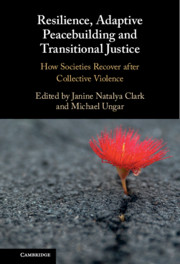Resilience, Adaptive Peacebuilding and Transitional Justice
Processes of post-war reconstruction, peacebuilding and reconciliation are partly about fostering stability and adaptive capacity across different social systems. Nevertheless, these processes have seldom been expressly discussed within a resilience framework. Similarly, although the goals of transitional justice – among them (re)establishing the rule of law, delivering justice and aiding reconciliation – implicitly encompass a resilience element, transitional justice has not been explicitly theorised as a process for building resilience in communities and societies that have suffered large-scale violence and human rights violations. The chapters in this unique volume theoretically and empirically explore the concept of resilience in diverse societies that have experienced mass violence and human rights abuses. They analyse the extent to which transitional justice processes have – and can – contribute to resilience and how, in so doing, they can foster adaptive peacebuilding. This book is available as Open Access.
Janine Natalya Clark is Professor of Gender, Transitional Justice and International Criminal Law at the University of Birmingham. She has written three research monographs and her work has been published in a wide variety of journals. She is currently leading a European Research Council-funded research project about resilience and survivors of conflict-related sexual violence.
Michael Ungar is a family therapist and Professor of Social Work at Dalhousie University where he holds the Canada Research Chair in Child, Family and Community Resilience. He has published over 200 peer-reviewed articles and 17 books on the subject of resilience for parents, researchers and mental health professionals.

